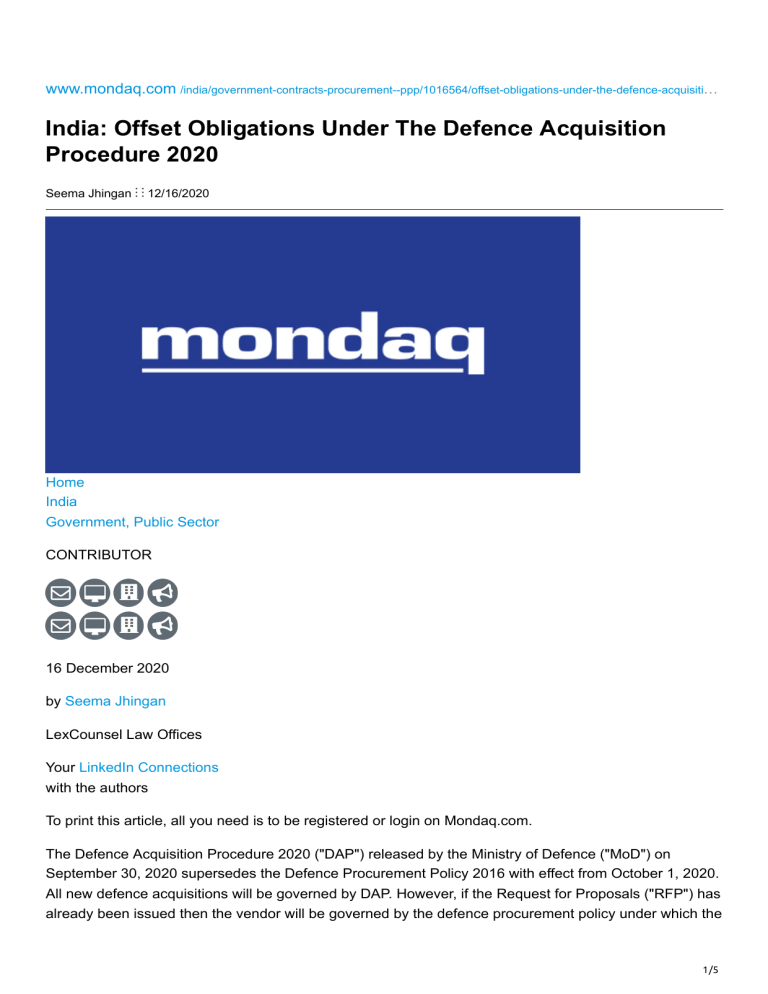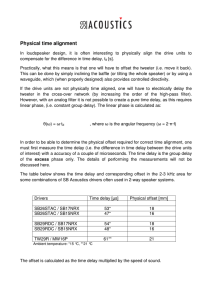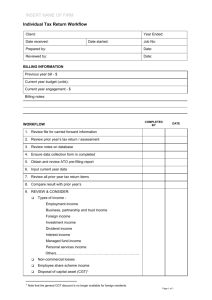
www.mondaq.com /india/government-contracts-procurement--ppp/1016564/offset-obligations-under-the-defence-acquisiti… India: Offset Obligations Under The Defence Acquisition Procedure 2020 Seema Jhingan ⋮ ⋮ 12/16/2020 Home India Government, Public Sector CONTRIBUTOR 16 December 2020 by Seema Jhingan LexCounsel Law Offices Your LinkedIn Connections with the authors To print this article, all you need is to be registered or login on Mondaq.com. The Defence Acquisition Procedure 2020 ("DAP") released by the Ministry of Defence ("MoD") on September 30, 2020 supersedes the Defence Procurement Policy 2016 with effect from October 1, 2020. All new defence acquisitions will be governed by DAP. However, if the Request for Proposals ("RFP") has already been issued then the vendor will be governed by the defence procurement policy under which the 1/5 RFP was issued. DAP has been introduced to ensure timely acquisition of military equipment, systems and platforms as required by the armed forces in terms of performance, capabilities, and quality standards, through optimum utilization of allocated budgetary resources. Key obligations including various amendments as introduced under DAP regarding the vendor's offset obligations and the Indian Offset Partners ("IOPs") are discussed hereunder: Offset Threshold and Offset Obligations: The offsets would be applicable for Buy (Global) categories of procurement where the estimated acceptance of necessity cost is INR 2000 crores or more. 30% of the estimated cost of acquisition in Buy (Global) category will be the required value of the offset obligations. An Indian vendor participating in the Buy (Global) category would be required to meet minimum 30% indigenous content ("IC"), failing which the main vendor would be required to discharge offsets as applicable in the case. In certain cases, the Defence Acquisition Council may consider partial or full waiver of the offset clause. In case of a waiver for a particular acquisition case, eligible/selected Indian vendors need not be exempted from the corresponding IC stipulations. No offsets will be applicable in all ab-initio 'single vendor cases', including procurements based on Inter Government Agreements/Foreign Military Sales. Technical Evaluation in Processing of Offset Proposals: The Technical Offset Evaluation Committee ("TOEC") will scrutinize the technical offset proposals (excluding proposals for Technology Acquisition by DRDO) to ensure conformity with the offset guidelines. In terms of DAP, Indian enterprises and institutions and establishments engaged in manufacture of eligible products are referred to as the IOP. The IOP is required to comply with the guidelines/licensing requirements stipulated by the Department for Promotion of Industry and Internal Trade, and the Ministry of Home Affairs, as applicable. During TOEC, the vendor is required to provide details pertaining to IOP wise work share, specific products and supporting documents indicating eligibility of IOPs in addition to conformity with other clauses in the offset guidelines. If the vendor is unable to provide these details at the time of the TOEC, the same may be provided to Defence Offset Management Wing either up to one year prior to discharge of offset obligations through that IOP or at the time of seeking offset credits. Services Excluded from the Avenues for Discharge of Offset Obligations: DAP provides for various avenues in relation to discharge of the offset obligations including direct purchase of, or executing export orders for, eligible products manufactured by, or services provided by Indian enterprises, including private and public sector. The annexure for the list services and products eligible for discharge of the offset obligations is however limited to the list of products only and does not include any services. Even the other lists such as the list of technology eligible for discharge of offset obligations and the list of critical defence technology areas and test facilities for acquisition by DRDO through offsets do not include services. In view of the above change, 'services' including the software development services are no longer specified as an avenue for discharge of offset obligations under DAP. Valuation of Offset: All investments made after signing of the main procurement contract will only be reckoned for discharge offset obligations. The date of discharge of offset obligations in relation to direct purchase of, or executing export orders for, eligible products manufactured by Indian enterprises will be reckoned as the date of invoice or the date of final payment whichever is later. In case of equity investment in defence manufacturing or other investments or transfer of technology 2/5 ("TOT") and technology acquisition the date of completion of the transaction, based on documentary evidence will be reckoned as the date of discharge of offset obligation. Multipliers: In the discharge of offset obligation in relation to direct purchase of, or executing export orders for, eligible products manufactured by Indian enterprises, the following multiplier will be permitted: a. Eligible products - Multiplier of 1.0 b. Components of eligible products - Multiplier of 0.5 If the IOP is a Micro, Small and Medium Enterprise and discharge of offset obligation is proposed herein, a multiplier of 1.5 will be permitted. In the discharge of Offset obligation in relation to investment in defence manufacturing, a multiplier of 1.5 will be permitted. If the investment is in Defence Industrial Corridors notified by the Department of Defence Production, a multiplier of 2.0 will be permitted. In the discharge of offset obligation in relation to investment in TOT to Indian enterprises for manufacture of eligible products, a multiplier of 2,0 will be permitted. In the discharge of Offset obligation in relation to acquisition of technology through TOT to Government institutions and establishments engaged in the manufacture and/or maintenance of eligible products, including DRDO, a multiplier of 3.0 will be permitted. In the discharge of offset obligations in relation to technology acquisition by the DRDO in areas of critical technology, relating to critical technology acquisition by DRDO, a multiplier of 4.0 will be permitted. Clubbing of multipliers is not permitted. Re-phasing of Offset Obligations: A vendor may, by giving reasons, request re-phasing of the offset obligations within the period of the offset contract. The re-phasing request of the vendor will be processed without any disincentives if the shortfall is re-phased to the following year. However, if the re-phasing of offset value is proposed over the subsequent years, then 5% additional obligation will be imposed on re-phased value of every year. This yearly additional 5% offset obligation for processing re-phasing request will be over and above the outright financial penalty on shortfall specified in Defence Offset Guidelines. Rephasing will not be permitted beyond the period stipulated in the Defence Offset Guidelines i.e., offset obligations are to be discharged within a time frame that can extend beyond the period of the main contract by a maximum of two years. Outsourcing of Contract by IOP and Value Addition: There is no specific guideline stating the percentage on the extent of work that can be outsourced/assigned by an IOP to another subcontractor (whether in the same group or not) under the Defence Offset Guidelines contained in the DAP. Therefore, an IOP can further assign major or majority of the work to another sub-contractor within or outside India. However, there is a concept of value addition for products which contain imported components, in the context of offsets as follows: "The concept of value addition will apply only for direct purchase/export of eligible products. Value Addition will be determined by subtracting (i) value of imported components (i.e.) import content in the product and (ii) any fees/royalty paid." Therefore, in case of purchase of products by the main vendor from an IOP, the value addition undertaken by the IOP in India will be determined by deducting (a) the value of imported components and (b) any fees/royalty paid. The general principle being that only the value addition undertaken by the IOP in India is counted towards offset obligations of the main vendor, while the 3/5 value of imported components and fees/royalties incurred by the IOP do not count towards the value addition and consequently the offset obligations of the vendor. Conclusion: Offset obligations can be discharged with reference to eligible products as specified in DAP, by any combination of the prescribed methods which includes direct purchase of, or executing export orders for, eligible products manufactured by IOPs. It is however the vendor of the main contract who is responsible for the fulfillment of the offset obligations, failing which the vendor will be liable for penalty and debarment as stipulated in the offset guidelines. There are no such obligations on the IOP or any additional obligations that have been imposed on an IOP under DAP. The Government of India has faced various challenges in enforcement of the offset obligations and many a times penalties have been imposed on vendors for non-compliance. As offset is a critical part of the Buy (Global) category procurement, the intent of the Government through DAP to further intensify the compliance and enforcement of offset obligations of vendors. LexCounsel provides this e-update on a complimentary basis solely for informational purposes. It is not intended to constitute, and should not be taken as, legal advice, or a communication intended to solicit or establish any attorney-client relationship between LexCounsel and the reader(s). LexCounsel shall not have any obligations or liabilities towards any acts or omission of any reader(s) consequent to any information contained in this e-newsletter. The readers are advised to consult competent professionals in their own judgment before acting on the basis of any information provided hereby. AUTHOR(S) Seema Jhingan LexCounsel Law Offices POPULAR ARTICLES ON: Government, Public Sector from India Doctrine Of Promissory Estoppel And Its Application Against Government – An Explainer LexOrbis The doctrine of promissory estoppel is an equitable doctrine evolved by equity to prevent injustice. The doctrine estops the promisor to retract from his promise in case while acting on the promise of the promisor... Regulatory Framework Of The Trade Receivables Discounting System (TReDS) Platform Stratage Law Partners The International Monetary Fund has predicted that India together with China will account for half of the global growth in 20231. Explainer | Vijay Madanlal Choudhary And Others v. Union Of India And Others 4/5 Tatva Legal The history of the PMLA can be traced back to the later part of the 1980s, when an urgent need was felt among various nations to protect their financial systems from money-laundering. Addressing FOCC's Regulatory Hurdles Under The Non-Debt Instrument Rules Khurana and Khurana The blog piece analyses the regulatory barriers to downstream investments in India that require immediate attention and resolution from the appropriate authorities. Lawyers As Gatekeepers / Reporting Agency Under PMLA: Does It Violate Attorney - Client Privilege? Sarthak Advocates & Solicitors In light of the upcoming onsite review of India's regulations and supervision by the international money laundering watchdog i.e. Financial Action Task Force ["FATF"] in November 2023, the Government... Doctrine Of Legitimate Expectation S&A Law Offices Legitimate Expectation means that a person may have a reasonable expectation of being treated in a certain way by administrative authorities owing to some consistent practice in the past or an express promise made by the concerned authority. FREE News Alerts Sign Up for our free News Alerts - All the latest articles on your chosen topics condensed into a free biweekly email. Register For News Alerts Upcoming Events More filters 5/5


